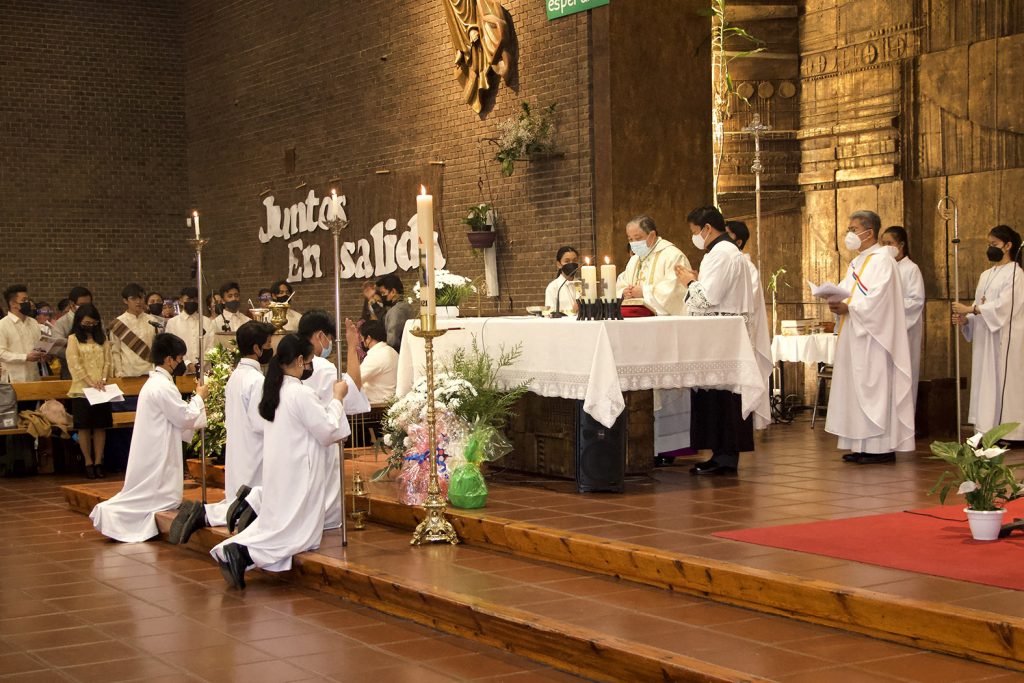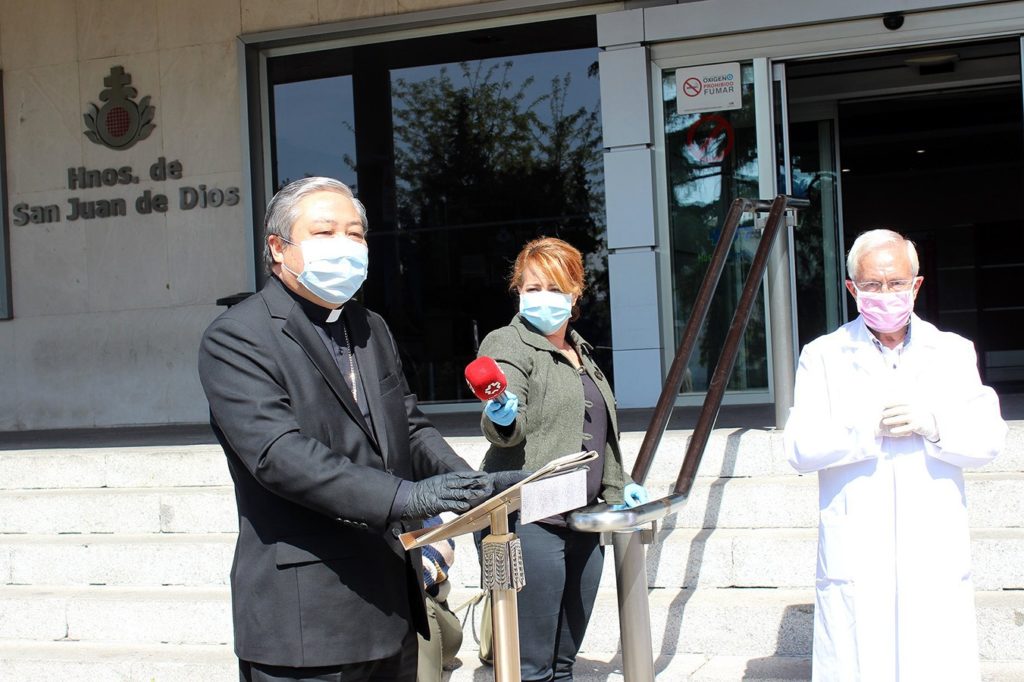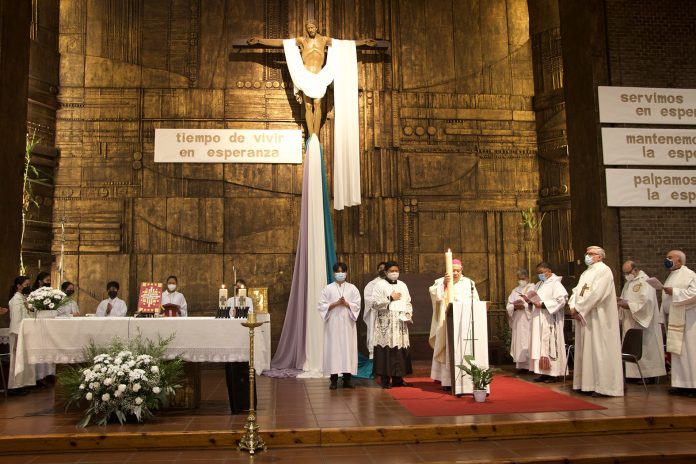On Easter Sunday, Archbishop Bernardito Auza, Apostolic Nuncio to Spain and Andorra, celebrated Mass with the Filipino community at the Parroquia de San Francisco Javier y San Luís Gonzaga in Madrid to commemorate the Fifth Centenary of Evangelization in the Philippines.
In the name of our Holy Father Pope Francis, a Blessed and Happy Easter to all of you, brothers and sisters in the Risen Lord! The Holy Father’s greetings and blessings extend to all our fellow Filipinos in Madrid and in the whole of Spain and Andorra who are not here with us today, especially to those who are suffering from the consequences of the pandemic. May our firm faith in the Risen Lord be our comfort and joy in spite of the trials and tribulations.
Mga kapatid, narinig na ba ninyo ‘yong sinabi ni Papa Francisco noong March 14 doon sa Saint Peter’s Basilica sa Vatican tungkol sa mga Pilipino, lalung-lalo na tungkol sa mga Pinay? On March 14, the Holy Father presided at the Mass in Saint Peter’s Basilica in the Vatican to mark the V Centenary of the arrival of Christianity in our islands. Sabi niya, tayo raw na mga Pinoy ay mga “trafikante” Trafikante? Laluung-lalo na raw ‘yong mga babae, mga “smugglers”. Ngunit salamat naman sa Panginoon, hindi trafikante at “smugglers” ng droga o ng mga kapwang tao! Kung hindi mga trafikante at “smugglers” daw tayo ng pananampalaya at magandang halimbawa! At mga Pinay daw sa Roma are known to be “smugglers of faith”, dahil kahit saan man daw sila, hindi lang magagaling sa trabaho, kung hindi ay “evangelizers” din, because they sow faith wherever they work. Nasa DNA daw natin ang ating pananampalataya, isang mabuting “infection”, for which the Pope wished that this good “infectiousness” be spread around, hindi gaya sa coronavirus! Sipsip si Santo Papa, ano?
Hermanos todos, what a privilege to be in Spain, where it all began! What began here in Spain that has been so relevant to us Filipinos? From Seville, the Expedition of Ferdinand Magellan, with some 270 crew members and five galleons, left for a voyage having for objective to reach the Spice Islands by taking the then untried and unknown western route.
It was an adventure into still unchartered waters and unknown world with untold historical consequences. For the world: it led to the first circumnavigation around the Earth. For the Philippines: March 16, 1521! For Limasawa: the celebration of the first historically recorded Mass on Easter Sunday, March 31, 1521. For Cebu: the first baptisms, the Santo Niño, the Magellan’s Cross, and the Pit Senyor. For Bohol, later in 1565: Miguel Lopez de Legazpi, Sikatuna, the Blood Compact, and the start of the Spanish colonization that lasted until 1898. Most of all, for us, the Catholic faith was planted and took root in our islands and in the hearts and souls of Filipinos across five hundred years.
Kilala ba ninyo si Yoyoy Villame? I am sure na ang mga jovenes at mga dito na ipinanganak hindi na nila kilala si Yoyoy. At palagay ko rin na marami din sa mga medyo matatanda na hindi na rin nila siya kilala. Si Yoyoy Villame ay taga Bohol gaya ko, isang bus driver noon high school student pa ako, pero nagiging sikat na sikat dahil sa kanyang mga kantang nakakatawa.
Isa sa kanyang mga kantang nakakatawa ay tungkol sa Philippine History, entitled “Magellan”, which starts with this information: “On March 16, 1521”. Yes, that was five hundred years ago last March 16. What happened on March 16, 1521? Yoyoy said that on that day, “the Philippines was discovered by Magellan”. According to Yoyo, having left Spain, Magellan and his men were sailing day and night across the big oceans. Then one year and a half later, on March 16, 1521, they landed in Samar. Then they moved to little Limasawa Island, where they celebrated with the natives of Limasawa the first Easter Mass in the Philippines on March 31, 1521.

Then from Limasawa, they moved to Cebu. And one of the most enduring and most popular religious image that Magellan brought to Cebu is…. Ano? Ang Santo Niño. On April 16, 1521 – Diyos ko, parang exam na yata ang susunod nito! – On April 16, 1521, Rajah Humabon and his wife were baptized Catholics. The Rajah took the name of Carlos in honor of Carlos I who authorized and bankrolled the Magellan Expedition, and the Queen took the Christian name of Juana, in honor of the mother of Carlos, Juana, the daughter of Isabela la Católica and Ferdinand of Aragón. And Magellan’s gift to Queen Juana was the statue of Santo Niño that we venerate in the Basilica of Santo Niño in Cebu City.
Five hundred years of faith. Five hundreds of being gifted with the faith, and we are invited to share it and give it to others. As the theme of the V Centenary celebrations beautifully puts it: gifted to give, a theme inspired by the Gospel of Saint Matthew (10:8), where Jesus teaches us that freely we have received and freely we have to give.
Today, as we celebrate with utmost joy the Resurrection of our Lord and Savior Jesus Christ, the first invitation is to rejoice: Rejoice, because the Lord has risen as he promised! How fitting therefore to praise and thank God for the five hundred years of faith and five hundred years of the first Mass in the Philippines! Rejoice, Filipinos, for your salvation has come and continue to bear abundant fruits to this very day. Rejoice, Filipinos in Madrid and throughout Spain, because you have made our missionaries proud by keeping the faith alive and active in your life and in your work!
Rejoice, Philippines, because the five hundred years of faith has produced enduring fruits of Christian life and holiness, of civilizing action, of the transmission – especially through a strong family life – of fundamental human and civic values.
Rejoice, Church in the Philippines, you have become the third biggest country in the world in terms of Catholic population, after Brazil and Mexico.
Rejoice, Filipino Catholics, because you have the excellent reputation as zealous and active, practicing and virtuous, rich in vocations and family loving. Rejoice, every Filipino family, every Filipino Diocese and parish and chapel! Rejoice, for it has pleased the Father to give you the Kingdom, fulfilled unceasingly in your midst through the power of the Risen Christ: to him be honor and glory forever!

Dear Brothers and Sisters in Christ,
Before our Lord ascended into heaven, he left this command to his disciples: “Full authority has been given to me both in heaven and on earth. Go therefore and make disciples of all the nations, baptizing them in the name of the Father, and of the Son, and of the Holy Spirit.” This command of the Lord to become missionary disciples is the meaning of the theme for this V Centenary: Gifted to give. Freely we have received; freely we have to give.
This command of our Risen Lord takes on a special meaning for us today, as we celebrate this Mass to commemorate the first Mass celebrated in the Philippines and the fifth centenary of the evangelization of the Filipino people. The first evangelizers rapidly made disciples among the Filipinos, baptizing them in the name of the Father, and of the Son, and of the Holy Spirit. We are more than 90 million Filipino Catholics, out of around 112 million Filipinos. Together let us praise God for this prodigious fruit of the work of the first evangelizers. In one great chorus, let us commend the Church in the Philippines and the whole Nation to God’s Providence: “Save your people, Lord, and bless your inheritance” (Ps. 28 (27), 9).
We, Filipino migrants, we are the fruits of that Church born in 1521 in our country. You have become the best missionaries of our Church. I don’t want to sound like a tour guide, but, yes, I have been to many places in the world. Almost everywhere, Filipinos are there. In Istanbul and Jerusalem and Dubai, in Rome and Madrid and Paris, in Helsinki and Vienna and Stockholm, in New York and Los Angeles and in the smallest city in the US, we are there…. I begin to suspect that the astronauts might find us in planet Mars, as well! And the first place we look for and where we gather is the church. We immediately warm to the local churches, join the choir, do the readings, become extraordinary Eucharistic ministers, do lots of volunteering, happily, freely, generously, giftedly.
Finally, as we remember with gratitude the first messengers of the Good News who came to the Philippines from Spain, let us pray for the Church in Spain, our host Church and our mother Church, which, for many decades now, has been experiencing a crisis of vocations to the priesthood and the religious life and a waning religious practice. We Filipinos today, we are the inheritance and inheritors of the faith the missionaries planted in our islands five hundred years ago. We are commissioned to make that faith bear abundant fruit everywhere we are. As an act of giving back and of gratitude, may we then be leavens of the Joy of the Gospel here in Spain!
Brothers and sisters, may this Eucharistic celebration truly awaken our hearts and minds to celebrate in faith, hope and love the great things the Lord has done to and for the Filipino people across five centuries of living the faith. Together we pray that God may continue to protect and guide his pilgrim People in the Philippines for the next 500 years. And beyond. Into eternity! Mabuhay ang Pilipinas.
Mabuhay ang Simbahang Pilipino! Amen.









